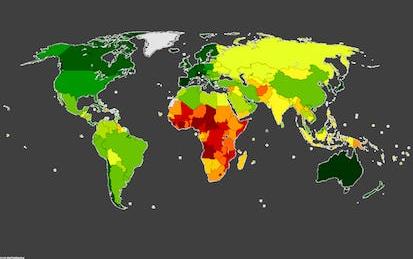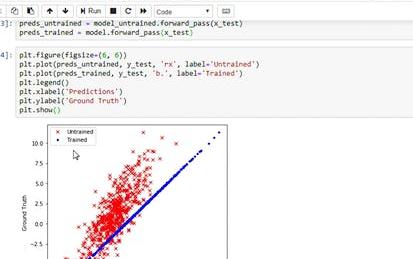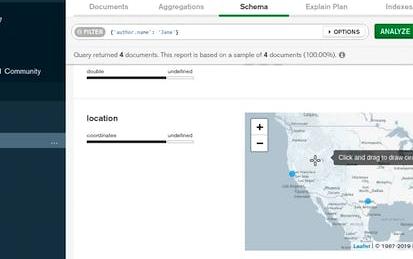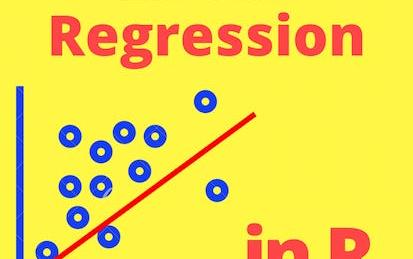

Our Courses

Life Expectancy Prediction Using Machine Learning
In this hands-on project, we will train a Linear Regression model to predict life expectancy.
-
Course by

-
 Self Paced
Self Paced
-
 3 hours
3 hours
-
 English
English

Advanced Statistics for Data Science
Fundamental concepts in probability, statistics and linear models are primary building blocks for data science work. Learners aspiring to become biostatisticians and data scientists will benefit from the foundational knowledge being offered in this specialization. It will enable the learner to understand the behind-the-scenes mechanism of key modeling tools in data science, like least squares and linear regression. This specialization starts with Mathematical Statistics bootcamps, specifically concepts and methods used in biostatistics applications.
-
Course by

-
 Self Paced
Self Paced
-
 English
English

Advanced Statistical Inference and Modelling Using R
Extend your knowledge of linear regression to the situations where the response variable is binary, a count, or categorical as well as to hierarchical experimental set-up.
-
Course by

-
 Self Paced
Self Paced
-
 English
English

Machine Learning: Concepts and Applications
This course gives you a comprehensive introduction to both the theory and practice of machine learning. You will learn to use Python along with industry-standard libraries and tools, including Pandas, Scikit-learn, and Tensorflow, to ingest, explore, and prepare data for modeling and then train and evaluate models using a wide variety of techniques.
-
Course by

-
 Self Paced
Self Paced
-
 38 hours
38 hours
-
 English
English

Supervised Machine Learning: Regression
This course introduces you to one of the main types of modelling families of supervised Machine Learning: Regression. You will learn how to train regression models to predict continuous outcomes and how to use error metrics to compare across different models.
-
Course by

-
 Self Paced
Self Paced
-
 21 hours
21 hours
-
 English
English

Accounting Data Analytics with Python
This course focuses on developing Python skills for assembling business data. It will cover some of the same material from Introduction to Accounting Data Analytics and Visualization, but in a more general purpose programming environment (Jupyter Notebook for Python), rather than in Excel and the Visual Basic Editor.
-
Course by

-
 Self Paced
Self Paced
-
 43 hours
43 hours
-
 English
English

Linear Regression with Python
In this 2-hour long project-based course, you will learn how to implement Linear Regression using Python and Numpy. Linear Regression is an important, fundamental concept if you want break into Machine Learning and Deep Learning.
-
Course by

-
 Self Paced
Self Paced
-
 2 hours
2 hours
-
 English
English

Unsupervised Learning, Recommenders, Reinforcement Learning
In the third course of the Machine Learning Specialization, you will: • Use unsupervised learning techniques for unsupervised learning: including clustering and anomaly detection. • Build recommender systems with a collaborative filtering approach and a content-based deep learning method. • Build a deep reinforcement learning model. The Machine Learning Specialization is a foundational online program created in collaboration between DeepLearning.AI and Stanford Online.
-
Course by

-
 Self Paced
Self Paced
-
 28 hours
28 hours
-
 English
English

Building and analyzing linear regression model in R
By the end of this project, you will learn how to build and analyse linear regression model in R, a free, open-source program that you can download.
-
Course by

-
 Self Paced
Self Paced
-
 3 hours
3 hours
-
 English
English

Statistics for Marketing
This course takes a deep dive into the statistical foundation upon which marketing analytics is built. The first part of this course will help you to thoroughly understand your dataset and what the data actually means. Then, it will go into sampling including how to ask specific questions about your data and how to conduct analysis to answer those questions.
-
Course by

-
 Self Paced
Self Paced
-
 17 hours
17 hours
-
 English
English

Regression Analysis: Simplify Complex Data Relationships
This is the fifth of eight courses in the Google Advanced Data Analytics Certificate. Data professionals use regression analysis to discover the relationships between different variables in a dataset and identify key factors that affect business performance. In this course, you’ll practice modeling variable relationships. You'll learn about different methods of data modeling and how to use them to approach business problems. You’ll also explore methods such as linear regression, analysis of variance (ANOVA), and logistic regression.
-
Course by

-
 Self Paced
Self Paced
-
 32 hours
32 hours
-
 English
English

Statistical Analysis with R for Public Health
Statistics are everywhere. The probability it will rain today. Trends over time in unemployment rates. The odds that India will win the next cricket world cup. In sports like football, they started out as a bit of fun but have grown into big business. Statistical analysis also has a key role in medicine, not least in the broad and core discipline of public health. In this specialisation, you’ll take a peek at what medical research is and how – and indeed why – you turn a vague notion into a scientifically testable hypothesis.
-
Course by

-
 Self Paced
Self Paced
-
 English
English

Mining Quality Prediction Using Machine & Deep Learning
In this 1.5-hour long project-based course, you will be able to: - Understand the theory and intuition behind Simple and Multiple Linear Regression. - Import Key python libraries, datasets and perform data visualization - Perform exploratory data analysis and standardize the training and testing data. - Train and Evaluate different regression models using Sci-kit Learn library. - Build and train an Artificial Neural Network to perform regression. - Understand the difference between various regression models KPIs such as MSE, RMSE, MAE, R2, and adjusted R2. - Assess the performance of regressio
-
Course by

-
 Self Paced
Self Paced
-
 2 hours
2 hours
-
 English
English

Introduction to Statistical Analysis: Hypothesis Testing
This introductory course is for SAS software users who perform statistical analyses using SAS/STAT software. The focus is on t tests, ANOVA, and linear regression, and includes a brief introduction to logistic regression.
-
Course by

-
 Self Paced
Self Paced
-
 10 hours
10 hours
-
 English
English

Data Science: Linear Regression
Learn how to use R to implement linear regression, one of the most common statistical modeling approaches in data science.
-
Course by

-
 35
35
-
 English
English

Business Statistics and Analysis
The Business Statistics and Analysis Specialization is designed to equip you with a basic understanding of business data analysis tools and techniques. Informed by our world-class Data Science master's and PhD course material, you’ll master essential spreadsheet functions, build descriptive business data measures, and develop your aptitude for data modeling. You’ll also explore basic probability concepts, including measuring and modeling uncertainty, and you’ll use various data distributions, along with the Linear Regression Model, to analyze and inform business decisions.
-
Course by

-
 Self Paced
Self Paced
-
 English
English

Necessary Condition Analysis (NCA)
Welcome to Necessary Condition Analysis (NCA). NCA analyzes data using necessity logic. A necessary condition implies that if the condition is not in place, there will be guaranteed failure of the outcome. The opposite however is not true; if the condition is in place, success of the outcome is not guaranteed. Examples of necessary conditions are a student’s GMAT score for admission to a PhD program; a student will not be admitted to a PhD program when his GMAT score is too low.
-
Course by

-
 Self Paced
Self Paced
-
 7 hours
7 hours
-
 English
English

Data Science with R - Capstone Project
In this capstone course, you will apply various data science skills and techniques that you have learned as part of the previous courses in the IBM Data Science with R Specialization or IBM Data Analytics with Excel and R Professional Certificate. For this project, you will assume the role of a Data Scientist who has recently joined an organization and be presented with a challenge that requires data collection, analysis, basic hypothesis testing, visualization, and modeling to be performed on real-world datasets.
-
Course by

-
 Self Paced
Self Paced
-
 26 hours
26 hours
-
 English
English

Statistical Modeling for Data Science Applications
Statistical modeling lies at the heart of data science. Well crafted statistical models allow data scientists to draw conclusions about the world from the limited information present in their data. In this three credit sequence, learners will add some intermediate and advanced statistical modeling techniques to their data science toolkit. In particular, learners will become proficient in the theory and application of linear regression analysis; ANOVA and experimental design; and generalized linear and additive models.
-
Course by

-
 Self Paced
Self Paced
-
 English
English

Predict Sales Revenue with scikit-learn
In this 2-hour long project-based course, you will build and evaluate a simple linear regression model using Python.
-
Course by

-
 Self Paced
Self Paced
-
 3 hours
3 hours
-
 English
English

Predicting Salaries with Simple Linear Regression in R
In this 1-hour long project-based course, you will learn how to create a simple linear regression algorithm and use it to solve a basic regression problem.
-
Course by

-
 Self Paced
Self Paced
-
 3 hours
3 hours
-
 English
English

Linear Regression and Multiple Linear Regression in Julia
This guided project is for those who want to learn how to use Julia for linear regression and multiple linear regression.
-
Course by

-
 Self Paced
Self Paced
-
 2 hours
2 hours
-
 English
English

Survival Analysis in R for Public Health
Welcome to Survival Analysis in R for Public Health! The three earlier courses in this series covered statistical thinking, correlation, linear regression and logistic regression. This one will show you how to run survival – or “time to event” – analysis, explaining what’s meant by familiar-sounding but deceptive terms like hazard and censoring, which have specific meanings in this context.
-
Course by

-
 Self Paced
Self Paced
-
 12 hours
12 hours
-
 English
English

Supervised Machine Learning: Regression and Classification
In the first course of the Machine Learning Specialization, you will: • Build machine learning models in Python using popular machine learning libraries NumPy and scikit-learn. • Build and train supervised machine learning models for prediction and binary classification tasks, including linear regression and logistic regression The Machine Learning Specialization is a foundational online program created in collaboration between DeepLearning.AI and Stanford Online.
-
Course by

-
 Self Paced
Self Paced
-
 33 hours
33 hours
-
 English
English

XG-Boost 101: Used Cars Price Prediction
In this hands-on project, we will train 3 Machine Learning algorithms namely Multiple Linear Regression, Random Forest Regression, and XG-Boost to predict used cars prices.
-
Course by

-
 Self Paced
Self Paced
-
 3 hours
3 hours
-
 English
English



